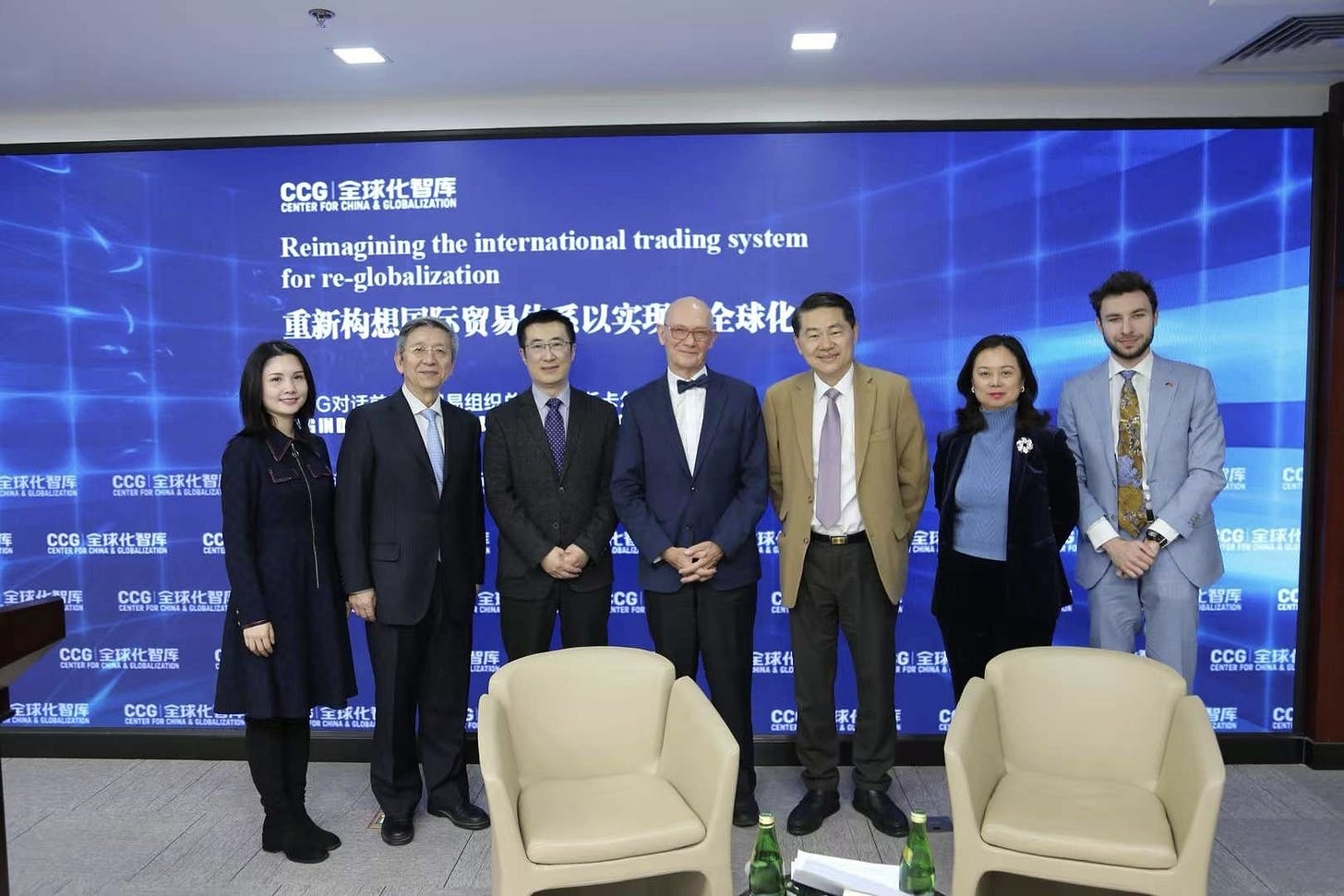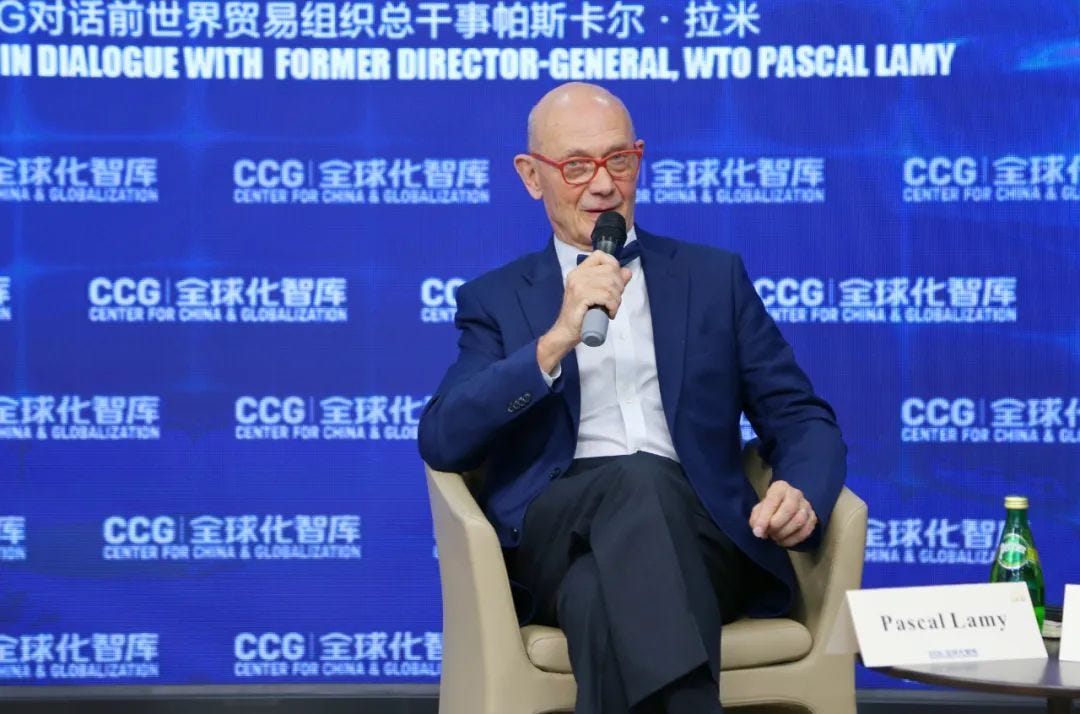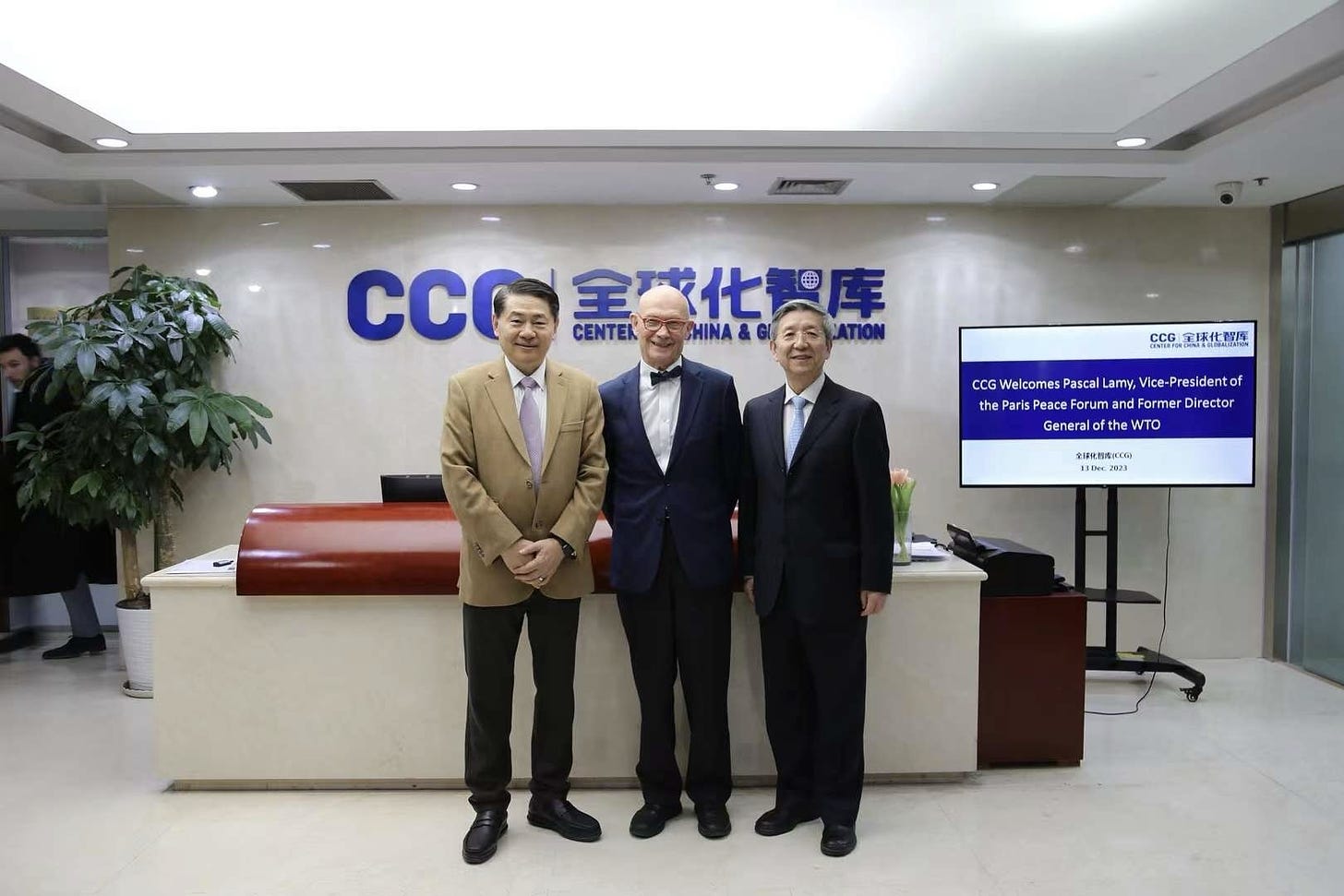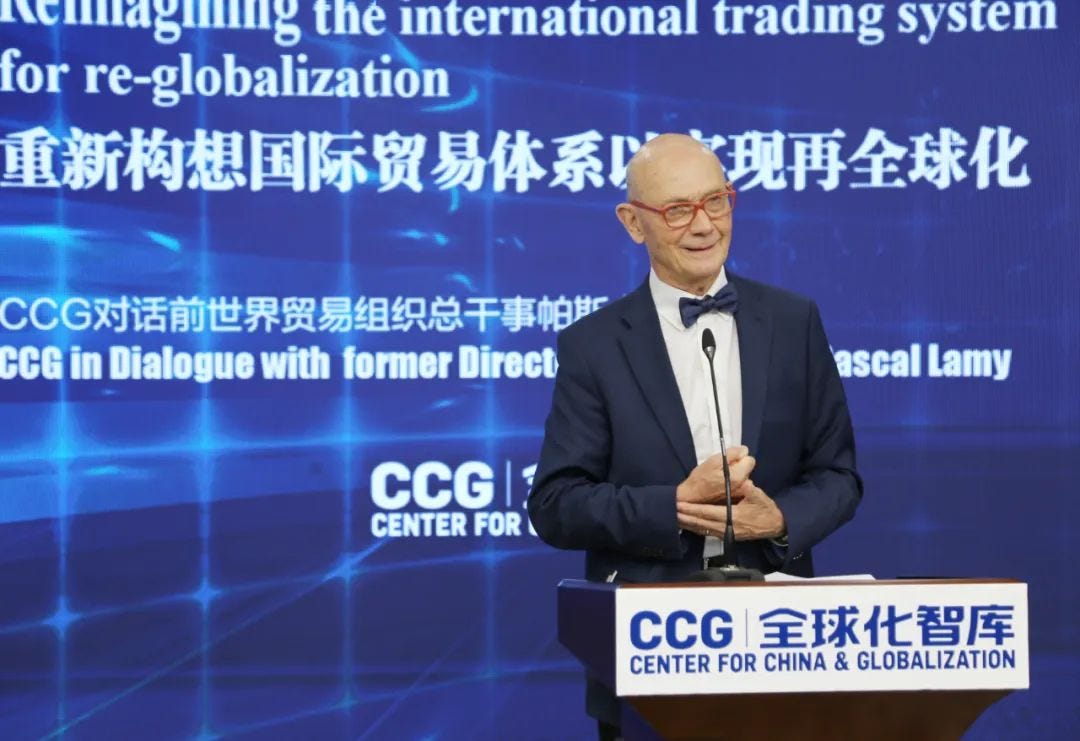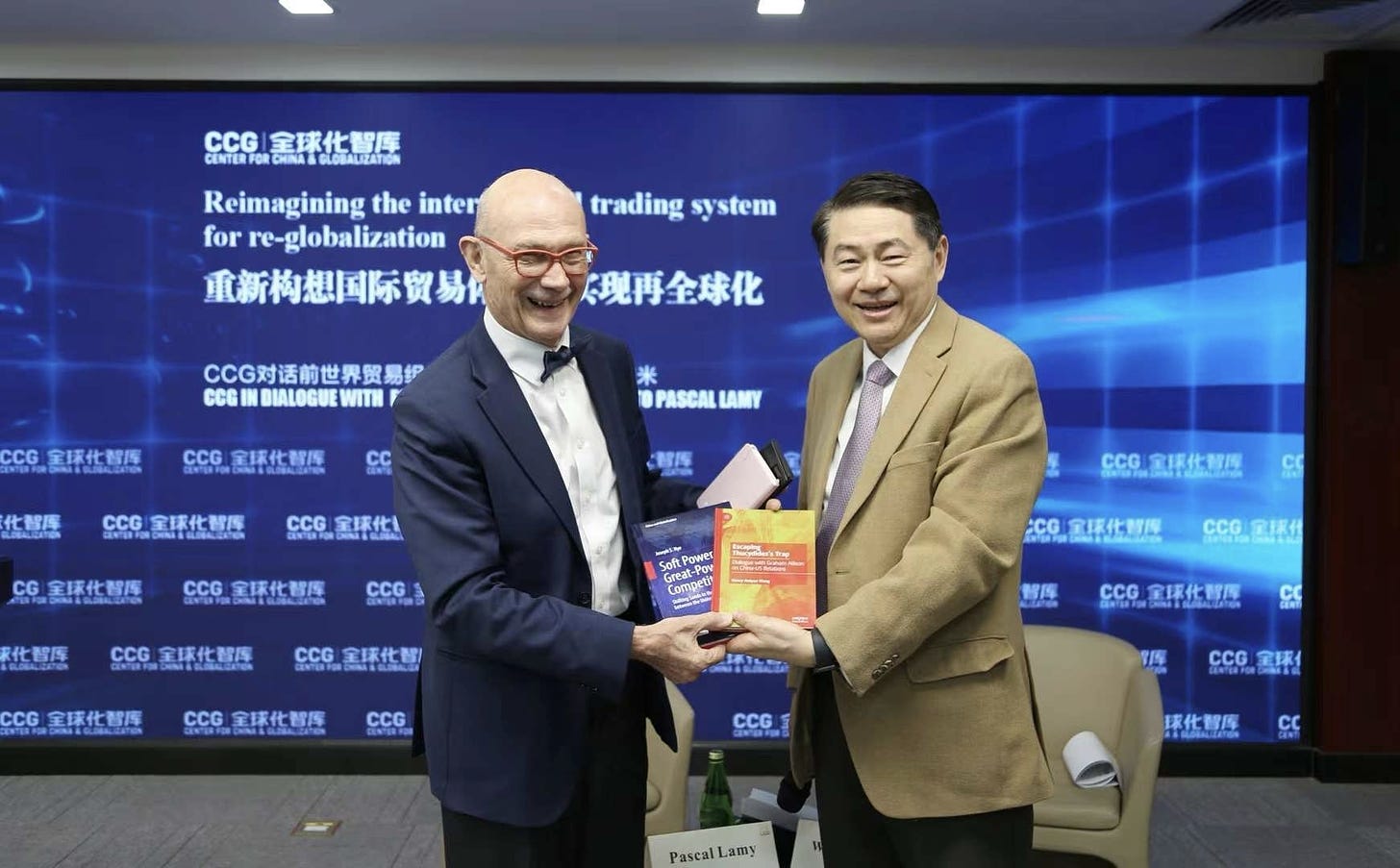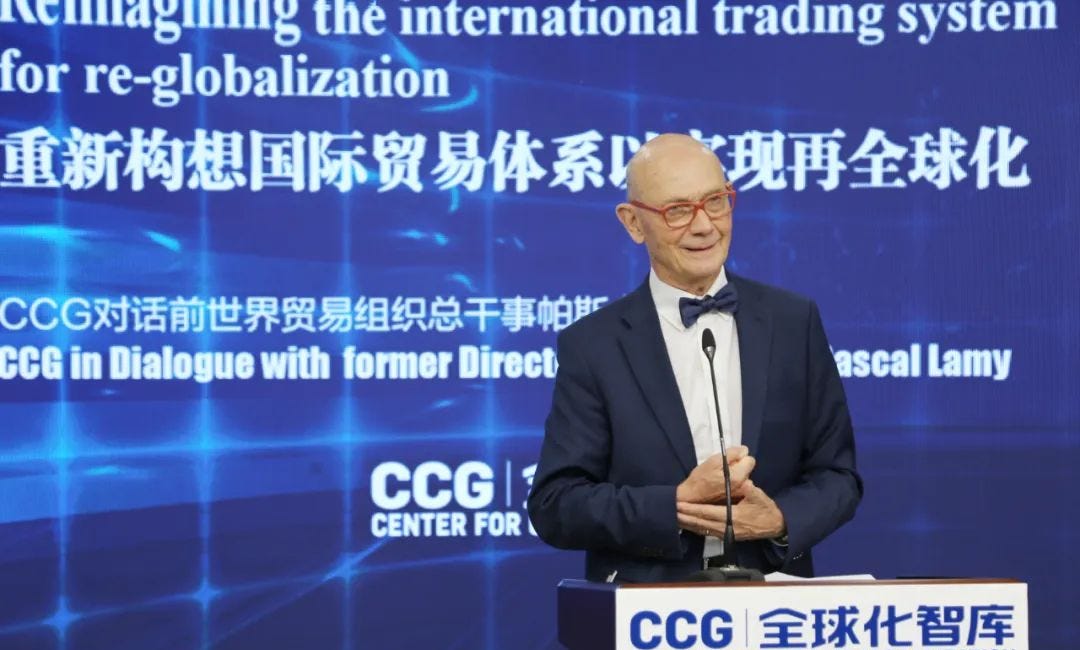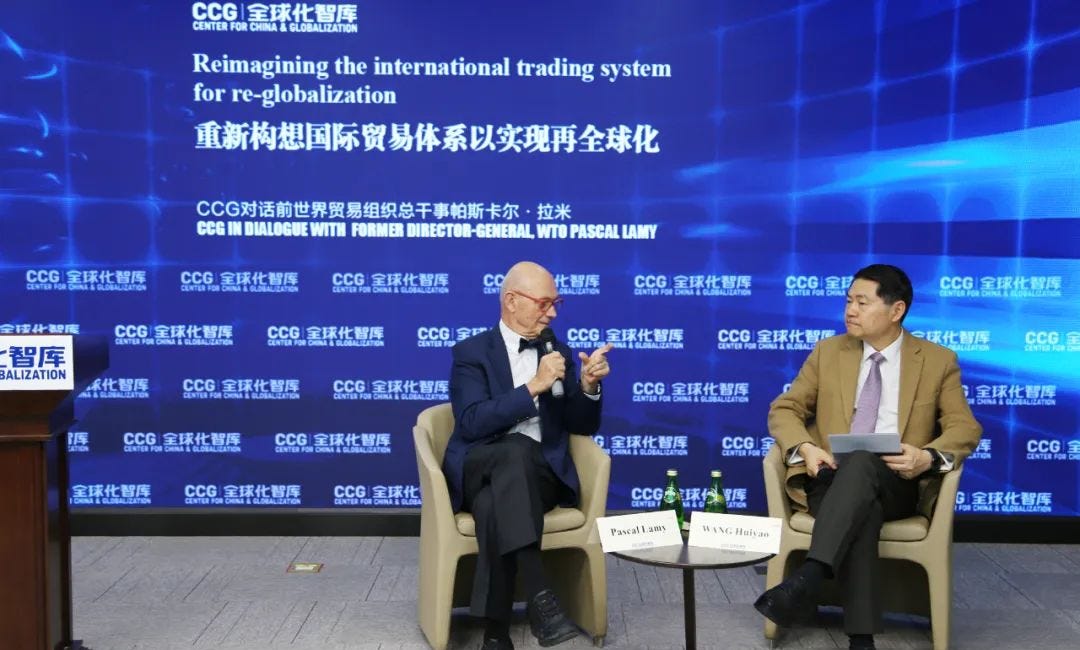Part III: Dialogue of Pascal Lamy with Chinese experts at CCG
The former Director-General of WTO reflected on China's overreaction to EU sanctions and miscalculations in China's WTO accession.
Hi, this is Jia Yuxuan from Beijing, bringing you the third and final part of the transcript of the Dec. 13 event at Center for China and Globalization (CCG), following Pascal Lamy's keynote speech and his dialogue with Henry Huiyao Wang, President of CCG.
The visiting former Director-General of WTO, after his speech and dialogue, interacted with Chinese trade experts and a People's Daily correspondent. The three Chinese experts were:
SUN Yongfu, CCG Senior Fellow, former MOFCOM Director-General of European Affairs
JI Wenhua, Professor at School of Law, University of International Business and Economics (UIBE)
LI Siqi, Associate Professor at China Institute for WTO Studies, University of International Business and Economics (UIBE)
The video of the full event has been published on the Chinese internet via CCG's official WeChat account and YouTube channel. CCG also broadcast the speech via a range of social media channels, including Baidu, Bilibli, Douyin, Guancha.cn, Kuaishou, and Weibo.
Lamy identified several causes for the decline in EU-China trade, including decreased investment, trade barriers, and economic slowdowns. Discussing the Comprehensive Agreement on Investment (CAI), he observed what he described as China's "overreaction" to European sanctions, which he believed was characteristic of China's unique system, similar to its overreaction to Australia and Lithuania.
Lamy acknowledged a miscalculation during China's WTO accession in 2001. The negotiators, including himself, were "appetized" by the opening of the Chinese market and overestimated the value of market access, not foreseeing, in his view, China's economic shift towards state-owned sector post-2010. While China honored its accession commitments, these were not as rigorous as they should have been, particularly regarding subsidies in emerging sectors like electric vehicles and renewable energy, he said.
Yongfu Sun:
Thank you very much. Thank you, Mr Lamy. We have known each other for many years because I was 12 years as the DG of the European Department in MOFCOM, and with our leaders and with our ministers, we had very serious discussions concerning China-EU trade-related matters.
And I have two questions for you.
One is that, from January to October this year, the China-EU trade decreased by 7.5%. This hasn't been seen for many years, at least I think 30 years. In my term as a DG for the European Department, we had very good economic and trade relations and the EU has been our number one trading partner for 16 consecutive years. So we haven't seen this decrease in our bilateral trade.
What is your idea of this phenomenon? Is it a kind of a short-term situation because of the shrinking of the demand from both sides and the not-so-rosy economic situations in the EU and also in China? Or is this because of the three definitions of the EU for China as a partner, competitor, and systemic rival? Does it make some sense that because of that rivalry that EU-China economic relations have decreased?
The other question concerns the investment. We have the so-called Comprehensive Agreement on Investment (CAI). The conclusion was finalized in 2020. And our leader Xi Jinping and the leaders from the EU announced that we have concluded our discussion concerning the CAI. But because of the Xinjiang’s so-called human rights issues, the geopolitical issues, and this CAI is dead in some way.
Do you see any possibilities to revitalize this CAI, to put it forward in a realistic way? Or in a short term, you don't believe that CAI will be in the right track in five or ten years even? So that's my two questions to you. Thank you very much.
Pascal Lamy:
So on the first question, I mean, I think this decrease in bilateral trade stems from three factors.
One is weaker investment in the previous years. The EU investment in China has decreased consistently for the last four or five years. In a nutshell, big companies remain in China and keep investing, notably German companies. But the inflow of mid-sized companies' investment has dropped. And the reason behind that is the perception in European public opinion that China is less secure than it used to be. And of course, politics is a big one. So I think there is an inevitable trade consequence of the slowing down of investment flows.
The second is that there still are serious obstacles to trade and investment in China. I created, when I was European Trade Commissioner, the EU Chamber of Commerce in China. If you read the report of the EU Chamber, and I know the Chinese administration does that because seriously, there are still too many obstacles to trade and investment from the EU into China, including, by the way, areas where the investment regime for EU is less favorable than for the U.S., which is a bit of an oddity, at least in my view.
And then there is the weak economy on both sides, which, of course, matters.
So that would be how much for each of these. I probably do not know, and I should look seriously at the numbers to say it's 30% and 40% and 30%—that's my sense.
Now, on the CAI, on the investment agreement, I will be very candid. China overreacted to a resolution voted by some members of the European Parliament [sic], as sometimes China does. China overreacted with Australia when Australia asked for a body investigating the origins of COVID. China overreacted when Lithuania did something that could have called the "one country, two systems" into question.
This is...and I will not say more because we all know that within the Chinese system, in this sort of cases, some say take it easy and others say no, and "pong." There is a problem with Chinese, which is about frightening chicken to make sure the monkey understands it. But that's how it works.
Wenhua Ji:
Thank you very much. And first, I thank President Wang for inviting me here. Also, I would like to thank Your Excellency, Mr. Pascal Lamy, for your very enlightening and informative presentation and the answers to the questions.
Indeed, before President Wang addressed the last question to you, I think I would have raised a question about the dispute settlement because you missed this issue in your previous presentation. And I remember that the reform of the dispute settlement system is a priority of the WTO reform. Since you raised the question, I will go a little bit further. Because I met you when I worked at the Chinese admission to the WTO, you were frequently requested by us to nominate the chair of the panel. So I think I will continue my dialogue with you on this issue.
Now, we all know the problem: the U.S. blocked the nomination of the Appellate Body, so the body was paralyzed. There is no incumbent member. You mentioned two possible solutions. One is that the U.S. rejoin the consensus, which means, OK, you accept the binding nature [of the WTO agreement]. Another one is that, OK, the U.S. was ousted. I think, well, of course, the latter situation is not the optimal one. It will cause a huge damage to the multilateral system, not only to the dispute settlement system.
So I personally made the proposal, a compromised proposal, because at least at this stage, from the proposal tabled by the U.S. in the negotiations, the U.S. has no intention to leave the system. It just wanted to not help the re-establishment of the Appellate Body. So at least the U.S. wishes to accept the binding nature. Of course, whether this is their real intention is to be seen during the MC 13.
My question is that, the intention of the U.S. is important, so what's the real intention or what's the role that the EU would like to play?
Because China’s position is very clear. In bilateral forums and multilateral forums, the China voice said consistently that we wish to have a two-tier binding system. The EU is also a proponent of the binding system and a main proponent of the MPIA [Multi-Party Interim Appeal Arbitration Arrangement]. However, as the G7 trade ministers declared recently, the G7 members only repeated the language in MC 12. There's no further explanation.
So from my perspective, I didn't see the EU as a main player who wished to exercise further pressure on the U.S. to make a further compromise or make its intention clear. So I am a little bit concerned with the possible position of the EU on this issue.
To put my question more clearly, if we cannot make any progress at the MC 13 on the dispute segment issue, will the EU leave the question as it is, or will the EU coordinate with China and other members to put more pressure on the U.S.? Thank you.
Pascal Lamy:
I think we have to go back to the essential. The essential is whether the U.S. or not accept the binding nature of the DSM (dispute settlement mechanism).
And this is unclear. This is unclear. And this is the defining line between an acceptable solution and a non-acceptable solution for the others, including the EU.
I was chief of staff of the president of the EU Commission when the Uruguay Round concluded with the Marrakesh agreement. And the binding nature of the dispute settlement was a last-minute, very last-minute, addition, which was negotiated between my predecessor, Leon Brittan, and Mickey Kantor, who was then a USTR [U.S. Trade Representative], on an instruction of Mr. Delors, who said we needed a binding dispute settlement. And Leon Brittan, I mean, did what he was told to do, but he's a British, so the notion that we would export to the WTO a sort of supranational authority was not very familiar to him. But he accepted it, and he convinced Mickey Kantor, who was a very shrewd guy, to accept it.
Then Mickey Kantor went to the U.S. Congress at the moment of ratification and said, "well, don't you worry, look at the wording. It says that determinations must be adopted by the members." And he didn't insist on the fact that there is a footnote, which was added, which makes the whole difference, which says the losing party cannot oppose the consensus. And of course, if the losing party cannot oppose the consensus, the decision is taken against the losing party, and then it has to comply. So Mickey Kantor was very clever.
But the fundamental issue behind all this is whether the United States of America accepts or not what they have never accepted before, which is the binding authority of a supranational body. Now, I would never put things in this way in Washington, because they would be terrified at what they did. But this is the real issue.
Now, the reason why Mickey Kantor convinced Congress is that he said, "we need a system that will make the others abide." And this will be good for the U.S., which by the way is absolutely true. This is absolutely true—it's good for the U.S. that the others abide, but of course, it's good for the others that the U.S. abide.
So this is the key question. And it's a major political problem for the U.S. And if I was trying to convince Congress, I would say, if the system does not oblige China to comply, then it's a bad system. And they would say, oh yes, that's absolutely true.
So this is the issue. If this is solved, I think the rest will follow. I think the EU for the moment is holding a sort of tactical position. And if the U.S. make it clear that it remains binding, they will flexibilize their position. And by the way, I also believe that if China was publicly more outspoken on the fact that the system has to remain binding, this would be good for the negotiation and good for China.
Siqi Li:
Thanks for having me in this roundtable discussion. I have two questions.
The first question is regarding the power transformation in the WTO. We all know that there is a leadership deficit in the WTO due to the shifting position of the U.S. But actually, this power transformation has already taken place since China's accession to the WTO upon the Doha Round. So what's your perspective on China's current role in the reform agenda? Is it possible for China and other emerging economies or also some developing countries to form a collective leadership role in this reform agenda?
My second question is regarding the prospect of the WTO. We all know that we are facing a consensus-based deadlock in multilateral negotiations. So some countries have a feasible alternative to turn to the JSI [Joint Statement Initiative] negotiations. But it is opposed by certain developing members like India and Africa who question this dual-track negotiation approach in the WTO. So what is your perspective on this JSI approach? Could that be the mainstream negotiation model in the WTO? Thank you.
Pascal Lamy:
On the first one, I think the political reality is that the feeling prevailed until now, for the last 20 years in China, that accession ticket was overpaid. This is the feeling on average. And I negotiated the final, final, final deal with Premier Zhu Hongji himself. And I can understand why in the Chinese system there is a remnant view that accession was paid here. And it is absolutely true that if you compare the level of development of China in 2000 to Brazil or India or other similar countries at the time, their trade regime is less open than the Chinese one. So as a consequence of that, China never was very forthcoming to move to a further round of liberalization.
And by the way, the best evidence of that is that each time during the negotiation of the Doha round, we would reach a stage where there might be an agreement, China would say, "Uh-uh. I'm a recently acceded country, so I need a rebate." So that's the reality.
Given that the areas where WTO rules are weak and do not constrain China enough, in my view, which is also the view of many countries on this planet who are not as rich as China to subsidize their production system; given that China knew that if there was to be a new trade opening package, subsidies would come in the discussion, China made sure that they would not be exposed. So if you add these two elements, this explains a certain passivity.
Not that China did not abide by its commitment. It did. And I've always said that publicly when I was EU Trade Commissioner, when I was DG of WTO, this notion that China cheated the accession and did not properly abide is not [true]. China did abide by its obligations.
But in the sector of subsidization, the obligations of China were not strong enough. And the ones who are responsible for that are people like me and the USTR and the Japanese trade negotiator at the time [who] were the big shots that negotiated China's accession. We, at the time, overestimated the value of market access and underestimated the value of binding rules on subsidization because we were appetized by the opening of the Chinese market, and rightly so.
And the pressure on my back as a negotiator was not about subsidies. The pressure on my back was on opening this and this and this and this, which was not opened enough, like telecoms. But we did not pay enough attention to subsidies. And we thought that the course which had been initiated by Deng Xiaoping, which is reform, opening, and privatization, would be pursued. And we got it wrong.
From 2010 on, China changed course and the state-owned sector re-augmented its proportion in the economy and the subsidization, as a consequence of that, re-augmented. So we did an error in not properly forecasting what China would be 20 years from then.
And by the way, each time, and I wrote this in a piece that was published a few months ago, when the US trade negotiator and myself discussed the issue of subsidies, both of us were in favor of moving more aggressively on subsidies. But in both of our teams, the lawyers told us, "Uh-uh. Be careful if you start shrinking the stitches of the net of subsidies, our subsidies will be caught. Airbus and Boeing, for instance.” And so we wrongly listened to our lawyers when they told us, "Be prudent, be careful, we will be caught." So that's the basic explanation of this situation where China abided, but really did not ask for more.
Now, on your second question, given the implications of removing trade obstacles for countries, you cannot impose a decision on the U.S., China, Europe, or India, etc. Inevitably, you need a consensus where big trade influences, U.S., EU, China, and India, are in agreement.
Consensus is not unanimity. There is a big difference between consensus and unanimity. Consensus is something you build, and the chair says, "I believe there is a consensus." And if somebody objects, then somebody says, "Oh, no, no, no, no, I disagree."
Unanimity is totally different. Unanimity is, "Are you all in agreement? Please raise your country's tax." And this is a totally different group dynamic. So consensus is something you can build, and roughly speaking, if you have an agreement between these major elephants, a deal is done. So it's consensus among the major players and leaders.
Now, I'm sure Uruguay or Thailand would not agree with me. But the experience shows that if this group agrees, it's a balance, basically. If U.S., EU, I could add Japan, because Japan would have to be in the [list]. And then you look at the composition of the Green Room, which is a sort of bureau of WTO, or executive whatever. That's how it works. So dwelling on consensus or majority is not the right issue.
People's Daily correspondent:
Thank you, Mr.Lamy. One question, very simple. I'm a reporter from People's Daily overseas website. You mentioned that Chinese economy was not in good shape before.
My question is that despite the challenges, China has achieved success in some areas such as electric vehicles. So in your opinion, which sector is the highlight of China's economy this year and why? Thank you very much.
Pascal Lamy:
On EVs, China has massively invested with public subsidization in production of EVs. They've reached a formidable level of cost-to-quality ratio, notably thanks to these public subsidies.
Now, the domestic demand in China for EVs is lower than the capacity which has been made. So China is producing very good price-to-quality EVs, too much for the internal market, way too much for the internal market, and has to export it.
Now, where can China export? Where are the big markets? U.S., Japan, EU, Turkey? Three of them are closed to exports of Chinese good quality-price ratio EVs. Only one is open, which is Europe. And this is not sustainable. Europe will not absorb only in Europe the overcapacity of the Chinese production system. This has to be either shrunk or shared. It's as simple as that.
I'm the first to recognize that China did extremely well. But if others close, the EU cannot remain open. If we do that, we'll have a huge political problem with our constituencies. They will have to close their propulsion factories. They will have to keep building their own EV capacity, which they do, but at a slower rate than China. Notably, the necessary CapEx is not subsidized or less subsidized, although it has now to be subsidized. But that's the situation.
Huiyao Wang:
We have to conclude there, but I just want to add a comment, Pascal. I think that the subsidy, of course, needs to be discussed. I know that the U.S. is starting to have a lot of inflation reduction acts and chips acts, a lot of subsidies. But on the other hand, you talked about the U.S. closing their EV car market, but Tesla makes half of their EV cars in China. And then they export to Europe, too. And also, for all those German and many European automakers in China, they are also developing EV cars here. Here is the state-of-the-art technology and R&D center.
So probably we need to work on that and to collectively find a way to solve that so that we can meet the targets of carbon peak and carbon neutrality. Otherwise, if we start another trade friction or trade war, that's probably going to slow down the overall objective of achieving carbon neutrality, which all the countries are trying to do so.
Pascal Lamy:
You're absolutely right, Henry. Tesla sells cars everywhere, but it's a totally different market segment from what the Chinese sell. It's extremely good quality and terribly expensive, whereas the Chinese cars are good quality and very cheap.
Huiyao Wang:
OK, we need to increase the price probably. Again, I think we had a very good discussion. You've been traveling around, you've been involved in many rounds of global negotiations. Of course, you are still leading on the climate, digital, and AI front.
It's great that we have your back to hear your views and to have a good, candid, and constructive discussion. So I really appreciate you coming and also our fellows, our experts, our media friends, and also, of course, people from embassies, from different think tanks. So on behalf of CCG, I would like to thank Pascal, our speaker today, very much, and also to all the audience coming here today.
Check out below the other two parts of Pascal Lamy's presence at CCG:





